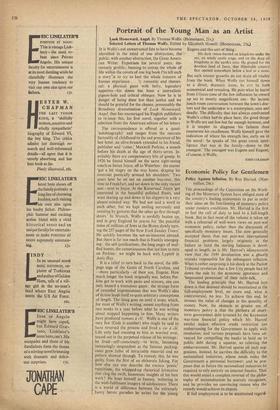Portrait of the Young Man as an Artist
Look Homeward, Angel. By Thomas Wolfe.
(Heinemann, 21s.) by Elizabeth Howell. (Heinemann, 25s.)
Selected Letters of Thomas Wolfe. Edited IT is Wolfe's not unwarranted fate to have become identified in the mind of one abstraction, the public, with another abstraction, the Great Ameri- can Writer. Expatriate for several years; im- mensely prolific; burning to entrap the whole of life within the covers of one big book ('to tell such a storyis to try to loot the whole treasure of human experience . . .'); romantic and rhetori- cal; a physical giant with hefty, legendary appetites—his doom has been a journalistic pigeon-hole and critical obloquy. Now he is in danger of being done less than justice and we should be grateful for the chance, presumably the Broadway dramatisation of Look Homeward, Angel, that has encouraged his English publishers to re-issue this, his first novel, together with a selection from the American edition of his letters.
The correspondence is offered as a quasi- 'autobiography' and ranges from the staccato factuality of childhood to the sad prescience of his last letter, an olive-branch extended to his friend, publisher and `cutter,' Maxwell Perkins, a month before his death at the age of thirty-seven. In- evitably there are compensatory bits of gossip. In 1926 he found himself on the same sight-seeing coach as James Joyce, off to Waterloo : the master `got a bit stagey on the way home, draping his overcoat poetically around his shoulders.' Two years later he set out on another bus-tour, this time to Frankfurt, and sat down in the only vacant seat—next to Joyce. At the Kaisersaal, Joyce 'got interested in the beautiful polished floors, and went skating up and down in his slippers in a very absent-minded way. We had not said a word to each other, but we kept smiling nervously and insisting by gestures that the other go first through doors.' In Munich, Wolfe is sordidly beaten up, and in grey England he yearns for `the peaceful noise of millions of Jews in the Bronx slowly turn- ing the 237 pages of the New York Sunday Times.' He quickly becomes the not-so-innocent abroad. But there is far too much that is frankly unengag- ing : the self-justifications, the long pages of muf- fled boasts, the censoriousness that led him to turn on Perkins : we might be back with Lypiatt in Antic Hay.
It is a relief to turn back to the novel, the 600- , page saga of the Gants of North Carolina, and
—ffiore particularly—of their son, Eugene. How much longer the book originally was, before Per- kins got to work with paste and scissors, one can only hazard a tremulous guess : the strange form of extended impressionism that was Wolfe's idea of fiction lends itself to quite arbitrary conceptions of length. The thing goes on until it stops, which, for most of Wolfe's writing, meant anything from two weeks to a year before what he was writing about stopped happening to him. Many wr,iters have produced romans a de: Wolfe is one of the very few (Gide is another) who might be said to have reversed the process and lived a vie a cle. Life only had meaning to him as worried over, teased out in the perpetual release of his writings : he lived—self-consciously—to write, becoming increasingly despondent as the famous packing- cases grew fuller of intractable material and no pattern showed through. To remedy this, he was guilty from the first of an elaborate faking. For how else can one describe the rococo `poetic' repetitions, the whipped-up rhetorical leiimotive that clog the swift, humorous insights of his best work? He loses himself in fantasy, weltering in the wish-fulfilment imagery of adolescence. There is a world of difference between •the extremely funny heroic parodies he writes for the young
Eugene and this sort of thing :
His dark vision burned on kingdoms under the sea, on windy castle crags, and on the deep elf kingdoms at the earth's core. He groped for the doorless land of faery, that illimitable country that opened somewhere below a leaf or a stone.
But such sinister growths do not drain all vitality from the book. When Wolfe ties himself down to a direct, dramatic scene, he can be both economical and revealing. He puts what he learnt from Ulysses (one of the few influences he owned up to) to mostly magnificent use: the laconic lunch-room conversation between the town's doc- tors and the undertaker is a masterpiece, sure and deadly. The difficulty that has always confronted Wolfe's critics has" its place here; the good things in Wolfe are not few but far enough between, and it is simpler to diagnose his failures than enumerate his excellences. Wolfe himself gave the indication of where his strength lies, early on in the novel : he speaks of 'the great comic intel- ligence that was in the family—down to the youngest.' The youngest was Eugene and Eugene, of course, is Wolfe.
JOHN COLEMAN


































 Previous page
Previous page